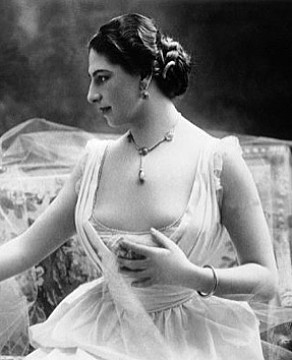Winnaretta Singer (1865-1943)
Winnaretta Singer, Princesse Edmond de Polignac

Father
She was born in Yonkers, New York, the twentieth of the 24-children of the founder of the Singer Sewing Machine Company. She grew up predominantly at the Oldway Mansion, the 115-room house her father built in Devon, England. After he died, she moved back to Paris with her French mother and despite being well-known as a lesbian in social circles, at the age of 22 she married Prince Louis de Scey-Montbéliard. Unsurprisingly, the marriage failed and it was annulled in 1892 on the grounds that the marriage was never consummated: a story is told that on their wedding night Singer climbed on an armoire and threatened to kill her new husband if he came near her! The following year (1893) she found a more agreeable companion in the 59-year-old gay amateur composer, Prince Edmond de Polignac. Their marriage was based on a deep friendship, mutual respect, and passion for music. She made no attempt to hide her sexualaity and had a string of very public affairs often with married women.
In 1893 she exhibited her artwork at the World's Exposition in Chicago. In 1894, she and her husband established a salon in Paris in the music room of their mansion that became a haven for avant-garde music and was attended by a distinguished crowd - many of Marcel Proust's memories of salons stemmed from the concerts held at the Polignac Salon. In addition to being a patron of the arts, Singer herself was also an accomplished pianist, and organist. After her husband died in 1901 she used her fortune to benefit the arts and sciences as much as possible, even choosing to honor his memory by commissioning several young composers to write many, now famous, works.
In 1893 she exhibited her artwork at the World's Exposition in Chicago. In 1894, she and her husband established a salon in Paris in the music room of their mansion that became a haven for avant-garde music and was attended by a distinguished crowd - many of Marcel Proust's memories of salons stemmed from the concerts held at the Polignac Salon. In addition to being a patron of the arts, Singer herself was also an accomplished pianist, and organist. After her husband died in 1901 she used her fortune to benefit the arts and sciences as much as possible, even choosing to honor his memory by commissioning several young composers to write many, now famous, works.
She was an important leader in the development of public housing in Paris. Her 1911 building of a housing project for the working poor was used as a model for future projects. When World War I broke out, she worked with Marie Curie to convert limosines into mobile radiology units for wounded soldiers at the front. During the 20s and 30s she commissioned the building and rebuilding of several public shelters for the Salvation Army in Paris and she also worked with Consuelo Vanderbilt Balsan to construct a 360-bed hospital to provide medical care to middle-class workers. After her death, her legacy of generosity was protected by the work of the Fondation Singer-Polignac, which she founded in 1928. It helps to fund science, literature, the arts, culture, and French philanthropy; and, continued to present concerts and recitals in the Polignac Mansion.
Categories
Share
Contributed by Mark Meredith on 01/04/2022 and last updated on 01/04/2022.

